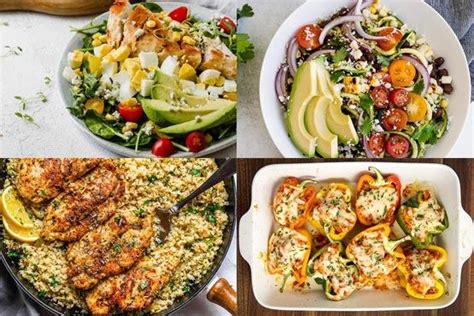Maintaining a healthy weight is crucial for seniors, as it can help prevent a range of health issues and improve overall well-being. Lunchtime plays a significant role in weight management, offering an opportunity to make nutritious choices that support weight loss. By focusing on balanced meals rich in fiber, lean proteins, and healthy fats, seniors can effectively manage their weight while also enjoying satisfying meals. This article provides practical lunchtime strategies tailored for seniors, offering tips on portion control, meal preparation, and smart food choices. Whether you’re looking to shed a few pounds or maintain a healthy weight, these tips will guide you towards healthier eating habits that fit seamlessly into your daily routine.
ujocis.net will provide a detailed exploration of this topic.
1. Incorporate High-Fiber Foods
For seniors seeking weight loss and digestive well-being, high-fiber foods are crucial. Fruits, vegetables, legumes, and whole grains are packed with fiber, which adds volume to meals. This increased bulk promotes a feeling of fullness, helping to curb overeating. This is especially beneficial for seniors, as it can regulate appetite and maintain consistent energy levels throughout the day.
Fiber is a valuable nutrient that contributes significantly to digestive health and overall well-being, especially for older adults. By promoting regular bowel movements and preventing constipation, fiber eases digestion. It also helps stabilize blood sugar levels, reducing the risk of diabetes and other metabolic issues. To increase fiber intake at lunchtime, incorporate leafy greens into salads, choose whole grain bread for sandwiches, or add beans to soups and stews. Focusing on fiber at lunch not only supports weight loss goals but also enhances overall health, making it easier to maintain a healthy diet in a sustainable and enjoyable way.

2. Include Lean Proteins
Lean proteins are essential for a healthy diet, particularly for seniors aiming to lose weight. These proteins, present in foods such as chicken, turkey, fish, eggs, and plant-based sources like tofu and legumes, play a vital role in building and maintaining muscle mass. As we age, muscle mass naturally declines, making adequate protein intake crucial for preserving strength and mobility.
Adding lean proteins to your lunchtime meals can be a powerful tool for hunger control. Protein keeps you feeling fuller for longer compared to carbohydrates or fats, preventing overeating later in the day and promoting steady energy levels. For a balanced lunch, consider grilling chicken or fish and pairing it with a salad, or adding beans or lentils to soups and stews. Plant-based protein sources like tofu or tempeh offer excellent alternatives. Prioritizing lean proteins at lunchtime not only supports weight management but also ensures seniors meet their nutritional needs as they age.

3. Opt for Whole Grains
Seniors seeking to boost their lunchtime meals and aid in weight loss can benefit from a simple yet impactful choice: opting for whole grains over refined grains. Brown rice, quinoa, oats, and whole wheat bread are excellent examples of whole grains that are packed with nutrients, including fiber, vitamins, and minerals, which are often lost during the refining process. Not only do these grains provide sustained energy throughout the day, but they also promote a feeling of fullness, helping to curb overeating.
Whole grains have a lower glycemic index than refined grains, leading to a slower, more gradual increase in blood sugar levels. This helps prevent energy spikes and crashes, which are particularly crucial for weight management and stable energy levels in older adults. Incorporating whole grains into your lunch is effortless – simply swap white rice for brown rice or quinoa, opt for whole wheat bread in sandwiches, or add barley or farro to salads and soups. These simple substitutions enable seniors to savor meals that are not only more nutritious but also more fulfilling, contributing to their overall well-being and weight management objectives.

4. Choose Healthy Fats
Incorporating healthy fats into your diet is crucial for overall well-being and can even contribute to weight loss, especially for seniors. Found in foods like avocados, nuts, seeds, olive oil, and fatty fish, these fats offer sustained energy and facilitate the absorption of fat-soluble vitamins, including A, D, E, and K. Additionally, they promote heart health by lowering bad cholesterol levels and bolstering good cholesterol.
Healthy fats can be a delicious and satisfying addition to your lunchtime meals. By incorporating them, you can enhance flavor and feel fuller for longer, reducing the urge to snack on unhealthy foods later in the day. Consider drizzling olive oil on salads, adding avocado slices to sandwiches, or enjoying fatty fish like salmon. Nuts and seeds, sprinkled over salads or mixed into yogurt, offer a satisfying crunch and additional nutritional benefits. Choosing healthy fats over saturated or trans fats helps seniors achieve their weight loss goals while maintaining a heart-healthy diet for overall well-being.
5. Portion Control
Portion control is essential for weight management, particularly for seniors. As we age, our calorie needs often decrease, and eating the right amount helps prevent overconsumption. By controlling portions, seniors can still enjoy a wide range of foods while ensuring they receive the necessary nutrients without feeling restricted.
To effectively manage portion sizes, try using smaller plates. This visual trick makes your meals appear larger, encouraging you to consume less. Furthermore, be mindful of your body’s hunger and fullness signals. Eat slowly and stop when you feel satisfied, not overly full. Pre-portioning snacks and meals can also be beneficial, as it eliminates the temptation to eat more than you planned.
For a balanced and healthy approach to eating, aim to fill half your plate with vegetables, a quarter with lean proteins, and the remaining quarter with whole grains. This strategy provides the right mix of nutrients while controlling portion sizes, promoting sustainable weight loss and overall well-being.
6. Hydrate with Water
Staying hydrated is crucial for everyone, but it’s especially important for seniors, particularly those aiming for weight loss. Water is essential for nearly all bodily functions, including temperature regulation, digestion, and nutrient absorption. Drinking water before and during meals can help manage appetite, as thirst is frequently mistaken for hunger. A glass of water before lunch, for example, can help you avoid overeating and better control your portion sizes.
Beyond curbing hunger, water plays a vital role in the body’s fat-burning process, making it a cornerstone of any weight loss plan. Seniors, in particular, should strive to consume a minimum of eight glasses of water daily, although personal requirements may fluctuate based on activity levels and general well-being.
To enhance your water experience, try adding a slice of lemon, cucumber, or a handful of fresh berries. These natural flavors provide a subtle taste without adding extra sugars. Steer clear of sugary beverages, as they can lead to weight gain and other health problems. By making water your go-to drink, you can aid your weight loss efforts while ensuring your body stays hydrated and performs at its best.
7. Add Plenty of Vegetables
Adding plenty of vegetables to your lunchtime meals is a fantastic way to support weight loss and boost overall health, especially for seniors. Vegetables are low in calories but rich in essential nutrients and fiber, which helps you feel full and satisfied. Including a variety of colorful vegetables in your lunch enhances the meal’s nutritional value and appeal, making it easier to maintain a balanced diet.
From spinach and kale to broccoli and Brussels sprouts, a diverse array of vegetables provides a wealth of health benefits. Leafy greens, cruciferous vegetables, and vibrant options like bell peppers and carrots are packed with vitamins, minerals, and antioxidants that bolster immune function, promote bone health, and boost energy levels. To make vegetables the star of your lunch, consider incorporating them into salads, stir-fries, or hearty soups. Roasting or grilling vegetables not only enhances their flavor but also makes them a delectable side dish.
By filling half of your plate with vegetables, you can enjoy a satisfying, nutrient-rich meal that supports your weight loss goals while providing essential vitamins and minerals.
8. Avoid Sugary Drinks
For seniors seeking weight loss and improved health, avoiding sugary drinks is essential. Beverages like soda, fruit juice, and sweetened teas are packed with added sugars, providing empty calories with minimal nutritional value. Consuming these sugary drinks can lead to weight gain, elevate the risk of chronic conditions such as diabetes, and cause energy dips that disrupt daily activities.
Skip the sugary drinks and choose water, herbal teas, or sparkling water with a dash of natural fruit juice for a refreshing change. Water is calorie-free and helps control your appetite and keep you hydrated. Herbal teas offer a variety of health benefits and flavors without added sugar. For a touch of sweetness, try adding slices of fruit or herbs like lemon, cucumber, or mint to your water.
Eliminating sugary beverages from your diet can dramatically lower your daily calorie intake, making it easier to achieve your weight loss goals. This straightforward modification, in conjunction with a balanced dietary approach and healthy eating practices, can enhance your weight management strategy and promote long-term well-being.
9. Limit Processed Foods
Cutting back on processed foods is crucial for successful weight loss and good overall health, especially for older adults. Processed foods, including packaged snacks, sugary cereals, and ready-made meals, are typically loaded with unhealthy fats, sugars, and sodium. These additives can lead to weight gain, elevated blood pressure, and other health problems.
Opt for whole, unprocessed foods over processed options during your lunchtime routine. Fresh fruits, vegetables, lean proteins, and whole grains offer the nutrients your body requires without the extra calories and additives present in processed foods. Making meals from scratch empowers you to control the ingredients and guarantee that your food is as nutritious as it can be.
To ease your transition to a healthier diet, begin by gradually swapping processed foods with wholesome alternatives. Instead of pre-packaged chips, try homemade vegetable sticks, and opt for whole grain pasta over refined varieties. Reading food labels can help you avoid products loaded with added sugars, unhealthy fats, and artificial ingredients. By limiting processed foods and prioritizing whole, nutrient-rich options, you can support your weight loss journey and enhance your overall health.
10. Plan and Prepare Meals Ahead
Meal planning is a powerful tool for seniors who want to maintain a healthy weight and diet. By planning ahead, you can consistently make nutritious choices and avoid unhealthy temptations. Meal planning also helps you control portion sizes, manage calorie intake, and include a variety of healthy foods in your meals.
Begin by crafting a weekly meal plan that incorporates a variety of high-fiber foods, lean proteins, whole grains, and a generous amount of vegetables. Allocate one day each week for meal preparation, during which you can cook and portion out meals for the upcoming days. Consider preparing a large batch of a nutritious dish, such as a vegetable soup or quinoa salad, which can be conveniently divided into individual portions and stored in the refrigerator or freezer.
To streamline your daily routine, consider keeping a list of go-to recipes and quick meal ideas in addition to cooking ahead. Utilizing portion-controlled containers will make storing and reheating meals more convenient. Planning and preparing meals in advance not only saves time but also minimizes impulsive food choices, which supports your weight loss goals and promotes overall wellness.
Incorporating these effective lunchtime strategies can make a significant difference in achieving and maintaining a healthy weight. By focusing on high-fiber foods, lean proteins, whole grains, healthy fats, and plenty of vegetables, seniors can create balanced and satisfying meals. Controlling portions, staying hydrated, and avoiding sugary drinks further support weight management. Limiting processed foods and planning meals ahead ensures a nutritious and sustainable diet. Embracing these practices not only aids in weight loss but also promotes overall health and well-being, making lunchtime a key opportunity for seniors to make positive dietary choices.
ujocis.net

